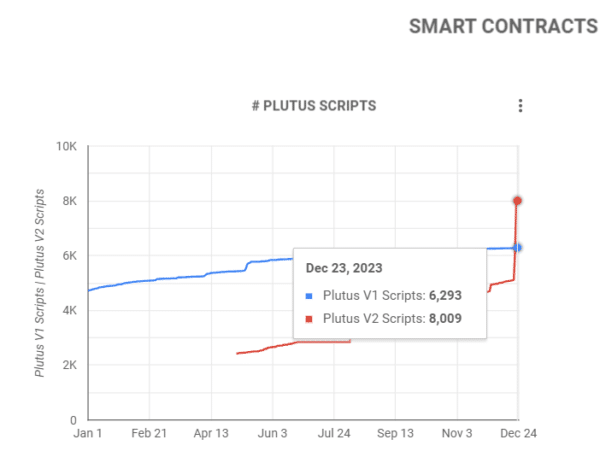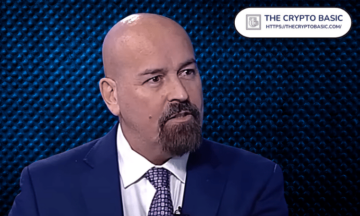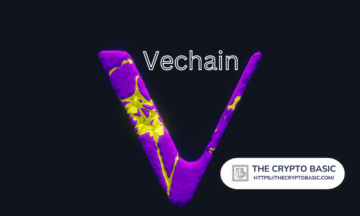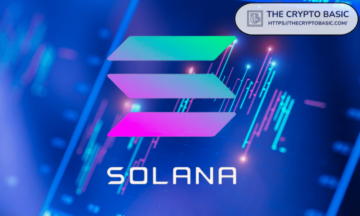Cardano smart contracts see explosive growth in 2023, outpacing early-year figures by over 200%.
Data has shown that the Cardano (ADA) blockchain has welcomed more smart contracts this year compared to the figures from early January.
Per statistics from Cardano Blockchain Insights, the number of Plutus V1 scripts on the Cardano blockchain has risen to 6,293, indicating a 33.38% growth from the initial count of 4,718 at the beginning of the year.
Similarly, the number of Plutus V2 scripts on the Cardano blockchain was 2,421 in May. However, that number has since grown 230% to 8,009 as of December 23.
Jointly, the Cardano Plutus V1 and V2 scripts have hosted a total of 14,302 smart contracts. This marks an addition of 9,584 smart contracts to the lower figure witnessed at the start of the year.


Cardano Smart Contract
The increase in Cardano’s smart contract count is in line with heightened network development endeavors aimed at enhancing the functionality of this feature. On December 15, the Cardano development team released the final update for the year concerning the Cardano ecosystem.
– Advertisement –
According to the report, the crew dedicated to the Plutus Core language successfully implemented common subexpression elimination (CSE) for Untyped Plutus Core. This implementation has led to both moderate and significant enhancements in the costs and sizes of most scripts.
Notably, Plutus Core is the programming language that establishes the connection between smart contracts and the final settlement layer of the Cardano blockchain.
Smart contracts debuted on the Cardano blockchain with the Alonzo hard fork in September 2021. The Plutus Platform is a building medium designed to create these smart contracts.
The purpose of smart contract functionality is to transform Cardano into a platform where developers can develop decentralized applications (dApps) and generate non-fungible tokens (NFTs), as available on the Ethereum blockchain.
Despite Cardano’s uptick in smart contract count, it is still miles behind Ethereum. To illustrate, statistics on Dune Analytics suggested that Ethereum saw a significant influx of 1,609,414 million smart contracts in April alone.
Follow Us on Twitter and Facebook.
Disclaimer: This content is informational and should not be considered financial advice. The views expressed in this article may include the author’s personal opinions and do not reflect The Crypto Basic’s opinion. Readers are encouraged to do thorough research before making any investment decisions. The Crypto Basic is not responsible for any financial losses.
-Advertisement-
- SEO Powered Content & PR Distribution. Get Amplified Today.
- PlatoData.Network Vertical Generative Ai. Empower Yourself. Access Here.
- PlatoAiStream. Web3 Intelligence. Knowledge Amplified. Access Here.
- PlatoESG. Carbon, CleanTech, Energy, Environment, Solar, Waste Management. Access Here.
- PlatoHealth. Biotech and Clinical Trials Intelligence. Access Here.
- Source: https://thecryptobasic.com/2023/12/26/cardano-ada-blockchain-welcomes-9584-smart-contracts-this-year/?utm_source=rss&utm_medium=rss&utm_campaign=cardano-ada-blockchain-welcomes-9584-smart-contracts-this-year
- :has
- :is
- :not
- :where
- 1
- 11
- 14
- 15%
- 2021
- 2023
- 23
- 302
- 33
- 8
- 9
- a
- ADA
- addition
- Advertisement
- advice
- aimed
- alone
- an
- analytics
- and
- any
- applications
- Applications (DApps)
- April
- ARE
- article
- AS
- At
- author
- available
- basic
- BE
- before
- Beginning
- behind
- between
- blockchain
- both
- Building
- by
- CAN
- Cardano
- Cardano (ADA)
- Common
- compared
- concerning
- connection
- considered
- content
- contract
- contracts
- Core
- Costs
- create
- crew
- crypto
- DApps
- data
- debuted
- December
- decentralized
- Decentralized Applications
- decisions
- dedicated
- designed
- develop
- developers
- Development
- development team
- do
- Dune
- Dune Analytics
- Early
- ecosystem
- encouraged
- endeavors
- enhancements
- enhancing
- establishes
- Ether (ETH)
- ethereum
- expressed
- Feature
- Figure
- Figures
- final
- financial
- financial advice
- For
- fork
- from
- functionality
- generate
- grown
- Growth
- Hard
- hard fork
- Have
- heightened
- High
- hosted
- However
- http
- HTTPS
- ID
- illustrate
- implementation
- implemented
- in
- include
- Increase
- indicating
- influx
- Informational
- initial
- insights
- into
- investment
- IT
- January
- language
- layer
- Led
- Line
- losses
- lower
- Making
- max-width
- May..
- medium
- million
- moderate
- more
- most
- network
- NFTs
- non-fungible
- non-fungible tokens
- NON-FUNGIBLE TOKENS (NFTS)
- number
- of
- on
- Opinion
- Opinions
- over
- personal
- platform
- plato
- Plato Data Intelligence
- PlatoData
- Plutus
- Programming
- purpose
- readers
- reflect
- report
- research
- responsible
- Risen
- s
- saw
- scripts
- see
- September
- settlement
- should
- shown
- significant
- since
- sizes
- smart
- smart contract
- Smart Contracts
- start
- Still
- Successfully
- TAG
- team
- that
- The
- The Crypto Basic
- These
- this
- this year
- to
- Tokens
- Total
- Transform
- Update
- v1
- views
- W3
- was
- webp
- welcomed
- Welcomes
- with
- witnessed
- year
- zephyrnet












